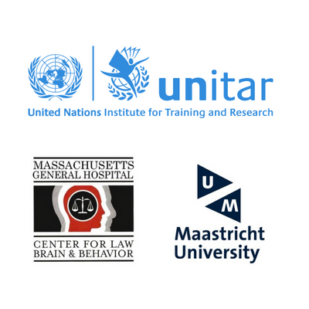February 28, 2023, 11:00 AM ET
Watch the recording here!

Advances in neuroscience have challenged core concepts of personal volition, agency and accountability. This webinar examined criminal responsibility in light of neuroscience models of addiction, psychiatric illness, decision-making, and volition. Webinar leaders from the University of Maastricht, University of Groningen, and the Center for Law, Brain & Behavior at Massachusetts General Hospital (Harvard Medical School) discussed comparative law approaches (European and American) to criminal responsibility and the extent to which these approaches do – or should – reflect current and emerging neuroscience findings. This webinar was presented in anticipation of coursework offered by UNITAR during Fall 2023 leading to an Executive Diploma on Law and Neuroscience – A Comparative Approach.
PANELISTS:
Dr. David Roef is an associate professor in criminal law and an extraordinary professor of criminal law and neuroscience at Maastricht University (https://www.maastrichtuniversity.nl/david.roef). His main fields of research and education are comparative criminal law, criminal policy, and neurolaw. He is also the co-founder of the interfaculty minor ‘human and legal decision making’ at Maastricht University, and board member of the Research Network for Law and Cognitive Sciences (LACS https://www.lacs.academy/. Recently he co-authored the handbook Comparative Concepts of Criminal Law (2019, Intersentia), and is involved in research projects on addiction and prior fault, and legal aspects of direct brain intervention.
Dr. Anna Goldberg is an assistant professor of criminal law at the University of Groningen. Between 2017-2021 she conducted her PhD research at Maastricht University in which she addressed addiction in criminal law, with a specific focus on the effects and role of neuroscience in this assessment. Interdisciplinary by default, her PhD research made use of a range of research methods including legal comparative designs, normative research, as well as qualitative and quantitative empirical research.
Dr. Robert Kinscherff is a clinical/forensic psychologist and attorney serving as Executive Director of the Center for Law, Brain & Behavior (CLBB) at Massachusetts General Hospital, Harvard Medical School. Core CLBB areas include applications of neuroscience and behavioral sciences to criminal law, elder law, juvenile and emerging adult justice, and refugee/asylum law. He is a Fellow of the American Psychological Association and has held leadership positions in government and clinical care systems. His practice areas include youthful and adult violent offenders with mental disorders, ethics and law in forensic behavioral health practice, and developmental interactions of adversity, trauma, and resilience. Dr. Kinscherff teaches/consults in the US and internationally for government entities, judges and attorneys, policymakers, medical and behavioral health professionals, and personnel in child protection, juvenile justice, and adult criminal justice and corrections roles.
Dr. Judith Edersheim is Co-Founder and Co-Director of the Center for Law, Brain & Behavior at Massachusetts General Hospital (MGH) and is an Assistant Professor at Harvard Medical School. Dr. Edersheim graduated magna cum laude and Phi Beta Kappa from Brown University and attended law school at Harvard, where she graduated cum laude. She was a law clerk to the Honorable Robert W. Sweet, United States District Judge for the Southern District of New York, and practiced law before returning to Harvard Medical School. She was a medical intern at the Mount Auburn Hospital and received her clinical psychiatry training at the Cambridge Hospital adult psychiatry residency program. Dr. Edersheim completed a fellowship in the Law and Psychiatry service at MGH. She is a member of the Bar of the Commonwealth of Massachusetts, is licensed to practice medicine in Massachusetts, and is Board Certified by the American Board of Psychiatry and Neurology, with added qualifications in Forensic Psychiatry.



